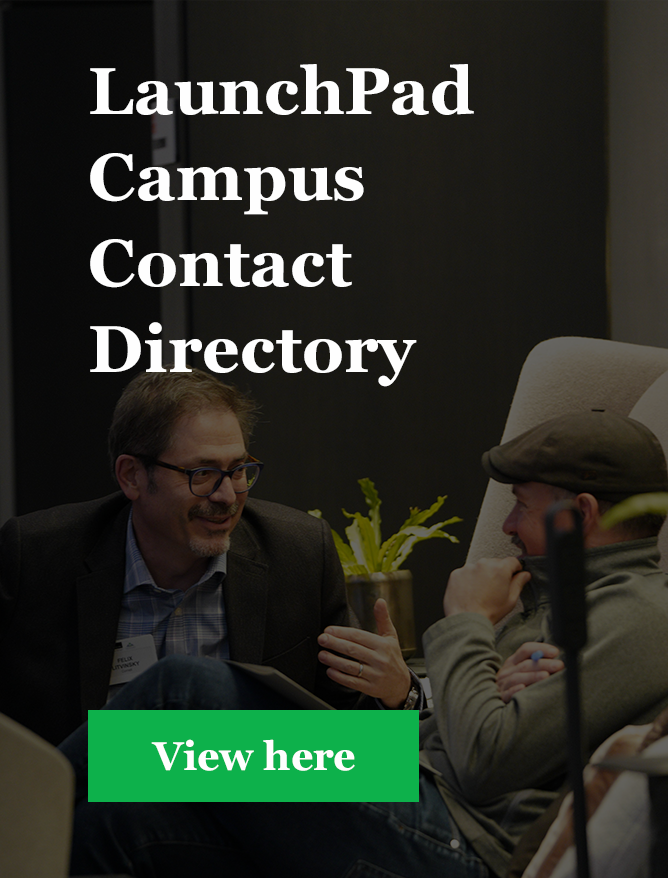Given the challenge of measuring early entrepreneurial student success through economic metrics (revenue, funds raised, jobs created, etc.), LaunchPad is in the early stages of developing an evaluation framework to quantify growth in student entrepreneurship skills. First the selection of skills, and subsequently the measurement mechanism of those skills, will be based on a number of resources including existing academic entrepreneurship research, existing skill-based models (like the National Association of Colleges and Employers (NACE) Career Readiness Key Competencies, conversations with industry-leading entrepreneurship organizations, and insights from you - our LaunchPad Campus Directors.
As a pilot to this future skills framework, we surveyed the students of the LaunchPad Summer Startup Fellowship at the beginning of this program and will survey them again at the conclusion. Each participant has been asked to evaluate themselves in a variety of areas that are grouped into six broad categories (average of scores within each section for Fellowship): Leadership (3.55), Management (3.55), Problem-solving (3.64), Communication (3.97), Social Capital (3.17), and Business Acumen (3.18). In addition to the resources, speakers, and mentors that your students will have access to over the course of the eight-week Fellowship, we encourage you to supplement these with your own discussions and activities.
Leadership. In this skill grouping, we are interested in measuring your students’ ability to plan strategically, identify goals and key results, motivate others, delegate work, coach and be-coached. Resources that can be helpful in strengthening these skills include strategic planning and goal-setting templates (like the Toolkit Goals module or HBR’s To Be a Great Leader, You Have to Learn How to Delegate Well), founder/co-founder success stories and case studies, and exercises around and enactment of giving and receiving feedback.


Management. This segment is all about maximizing results with limited resources, be that managing team time, talent, or dollars required to accomplish a goal. We are also interested in measuring students' abilities related to humility/empathy and crisis management in this group. Resources that may be helpful here include project, people, and time management tools (like Startup School’s video on Prioritizing Time) and methodologies, as well as EQ training and education.


Problem-solving. Identified by independent research, some of the most important personal skills and attributes of successful entrepreneurs are grouped into this category. These include creativity, resilience and resourcefulness, and accountability. Design thinking modules (like the Toolkit Category Design module or TEDx’s Kickstart Your Creativity series) and exercises that stretch the imagination and encourage inventiveness are important here, as well as stories of personal fortitude and guided reflections on past achievements in overcoming adversity.

Communication. Student founders must be able to clearly and effectively share their idea and its value proposition with multiple audiences, from customers and investors, to potential employees and business partners. We’re interested here in evaluating the written and verbal communication skills of our student entrepreneurs in a number of settings and with groups of varying sizes. Resources here may include rehearsing pitches (Toolkit Give Your Elevator Pitch), viewing and evaluating others’ presentations, and learning about the challenges and opportunities of communicating both in-person and remotely via email, phone, and video.


Social Capital. The opportunity to meet and build relationships with individuals who can help a student entrepreneur has dramatically shifted with the impacts of coronavirus. As such, we believe, networks like LaunchPad - and the ability to leverage opportunities available through these kinds of organizations - are more important than ever. The skills required to be successful here include identifying the potential impact of an individual, managing that relationship, and building a community of advocates. Resources include role-playing exercises, guided and moderated meetings - followed by analysis and feedback, and best practices for various types of interactions (like the LaunchPad Mentor Guide or CMX’s 10-Step Process for Building a Thriving Community).


Business Acumen. Perhaps the most unfamiliar to some students, skills in this group include product design, budgeting and finances, legal and operational expertise, and the ability to conduct customer discovery interviews. Resources that can be helpful in these areas may be lessons on the lean methodology, case studies of early-stage business set-up (Kristy Nathoo’s presentation on Startup Financing Mistakes), and templates for common operations and processes.


While these are certainly not all the critical skills necessary for student entrepreneurs to be successful, they do include some of the most commonly cited. As we evaluate the progress of our LaunchPad Fellows we’ll also be evaluating our evaluation. If you have informative experience in this area and recommendations to share, we strongly encourage you to reach out and have a conversation with anyone involved with the LaunchPad at Blackstone Charitable Foundation or Techstars.






